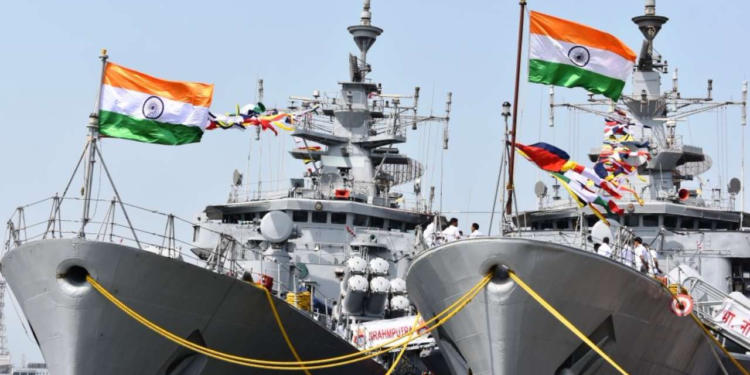Indian Navy deployed nuclear submarines and other assets in Northern Arabian Sea after the escalation with Pakistan in the wake of Pulwama attack. INS Arihant and INS Chakra are the two indigenous nuclear-powered submarines. “India had deployed nuclear attack submarine INS Chakra as part of the Aircraft carrier INS Vikramaditya Carrier Battle Group in the operational deployment after the Pulwama attack. The INS Chakra was deployed to provide protection to the aircraft carrier,” tweeted ANI quoting Indian Navy sources. The deployment of warships and aircraft carriers forced the Pakistan Navy to remain deployed Makran coast and not venture in the open sea.
Indian Navy sources: India had deployed nuclear attack submarine INS Chakra as part of the Aircraft carrier INS Vikramaditya Carrier Battle Group in the operational deployment after the Pulwama attack. The INS Chakra was deployed to provide protection to the aircraft carrier. https://t.co/Kn8aA6dpdz
— ANI (@ANI) March 17, 2019
Indian Navy on deployment of its assets in wake of the terrorist attack on CRPF convoy in Pulwama, J&K.: The overwhelming superiority of the Indian Navy in all three dimensions forced Pakistan Navy to remain deployed close to Makran coast and not venture out in the open sea. pic.twitter.com/3Xx0G3Gy9E
— ANI (@ANI) March 17, 2019
The neighboring country has a small coastline compared to India and Pakistani Navy is very weak in comparison. Indian Navy has 16 submarines including 1 nuclear-powered attack submarine, 1 aircraft carrier, 1 amphibious transport. In addition to that, the country has 14 destroyers, 13 frigates, 106 patrol and coastal combatant vessels, and 75 combat capable aircraft. On the other hand, the Pakistani Navy has just 9 frigates, 8 submarines, 17 patrol and coastal vessels, and 8 combat capable aircraft.
Pakistan deployed its entire Navy at its coastline two days after the Indian Air Force bombed the Jaish-e-Mohammed terror outfits in Balakot, reported ThePrint. On February 28, a day after Indian Air Force Wing Commander Abhinandan Varthman shot down F-16 with MiG-21 for violating Indian Airspace, Pakistan Navy was out at the Arabian Sea at the ports of Karachi, Ormara and Gwadar.
Given the naval superiority of India, the country opted the option of the naval blockade to weaken Pakistan. Pakistan does not have the capability to stop the Indian Navy from blocking its supplies due to weak naval capability. Pakistan has complained to countries like the United States that India is moving most of its warships to the Arabian Sea. This represents the fear of Pakistan that India could block the supplies of fuel and other important imports. As per the estimation of German Board of Public Health, more than 7 lakh civilians died in Germany due to starvation and disease caused by blockade of supplies by allied powers. Pakistan fears that it would face the same situation if India blocks the supplies.
The main base of Pakistan Navy is the Karachi port, the largest one in the country. As per the satellite imagery, submarines, frigates have been out from Karachi port from February 28 to March 8. Some unusual activities were also witnessed even on the Omara port of Pakistan which has very few ships. The Gwadar port being developed by China was also empty as of March 6, shows the satellite imagery exclusively accessed by ThePrint.

The air strike by the Indian Air Force was the first attack in the entire history by a nuclear power against another nuclear state. However, Pakistan did not retaliate against India in a way, it would have wanted. The air intrusion by Pakistan on the Indian soil was more like ‘Sorry, but I got to do this to save my face’. The country fears that in any warlike situation, it stands nowhere to India. The naval superiority, air force prowess of India stops Pak from taking any action against India.

























